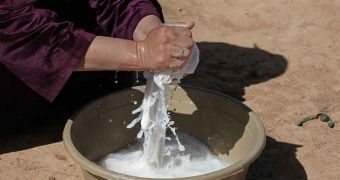We've seen many inventions and concepts involving 3D printing technology that could help cure injuries and diseases, even improve or enhance the human body, but they're still some time away. That doesn't mean there aren't any health-related applications that can be put into practice at once, though.
Indeed, while the healing of injuries and sicknesses is all well and good, preventive measures are just as relevant, and can save as many lives, if not more.
If you're the kind of person who gets involved in or likes to know about humanitarian missions, you might have heard of Oxfam.
Oxfam is an organization that wants to eradicate poverty. A tall order, to be sure, but we all have to start somewhere. Besides, every victory, no matter how small, is still a victory.
Currently, Oxfam has in its sights Syrian refugees who fled to Lebanon in order to escape, or at least reduce, the cases of diarrhea and other diseases.
Hollywood and the rest of the media often uses such illnesses for comic effect, but it's a sad fact of life that there are plenty of regions in the world where treatment for them is hard to come by, or just too expensive, or both.
There isn't an easy way to bring down drug prices, and even donations can only do so much. That means that preventive measures are all the more important.
Oxfam has partnered with online 3D printing platform MyMiniFactory in its goal to provide Syrian refugees with, to start with, a printable water-efficient hand wash system.
MyMiniFactory will be accepting design submissions from anyone in the world (that's the beauty of Internet) and will e-mail a few to the Oxfam team, once they settle on which would work best and be cheapest (and fastest) to make.
Oxfam will 3D print them and, after testing, will send feedback to MyMiniFactory, telling the company how to refine the models for better efficiency.
This sort of collaboration would not have been impossible five years ago, when there still weren't any affordable 3D printers up for sale anywhere.
Now, though, organizations should be able to adopt the practice, to the point where they just ship 3D printers and print material to remote sites instead of trucks filled with equipment of whatever sort.
It is hoped that Oxfam's deal with MyMiniFactory will give such organizations the cue and nudge they need to make that all too essential step.

 14 DAY TRIAL //
14 DAY TRIAL //